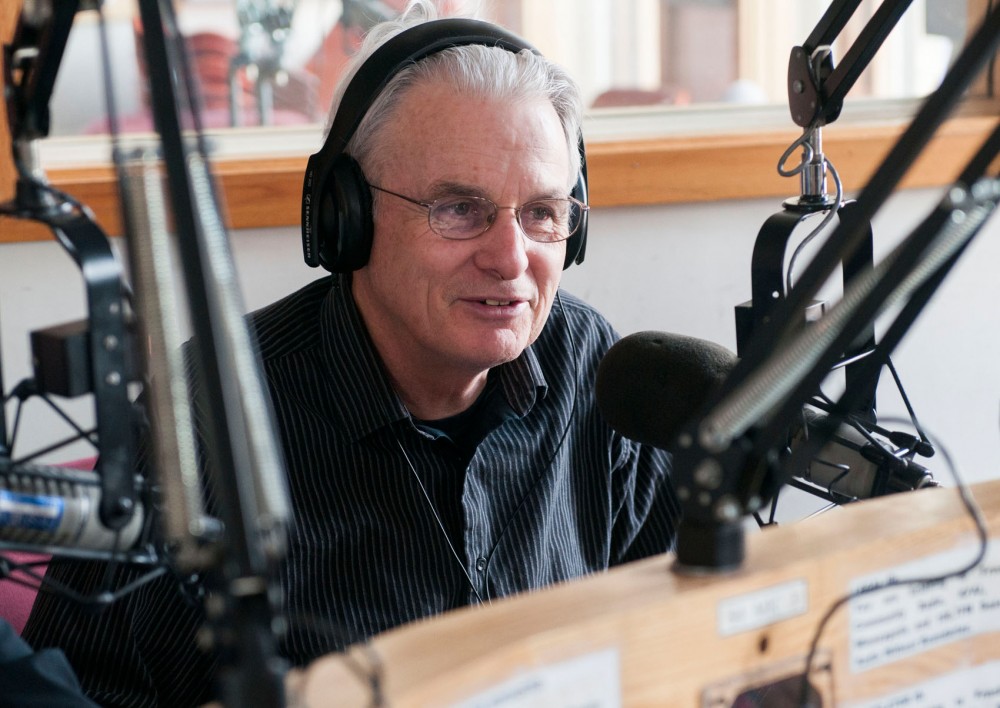Until recently, the DJs on “African Rhythms” had to rely on more expensive means of finding new music. They’d use their connections to purchase obscure music everywhere from Mali to the Ivory Coast.
Charles Sugnet, an associate professor of English at the University of Minnesota, co-hosts KFAI radio’s “African Rhythms” and remembers hassling friends and colleagues to buy LPs and cassettes for him.
“It was like contraband,” he said. “I used to give people lists of the things I was looking for when they went over.”
Even though the Internet makes it easier to find little-known African labels, “African Rhythms” friend and regular traveler Bill Orth holds a stack of CDs he procured on a recent trip to Tanzania. The hosts’ personal collections form much of the two-hour program each week.
As the only show devoted to African music in the Twin Cities, “African Rhythms” uncovers melodies both past and present. The hosts spin everything from the traditional Congolese music to the latest Kenyan hip-hop.
“With the new music that’s sweeping across Africa, a lot of it is electronic,” George “Jojo” Ndege, co-host of the show, said. “Especially with the new generation. Sometimes when we play it, people ask, ‘Is that African music?’”****
“African Rhythms” features a diverse collection of songs encompassing music from Africa as well as the African Diaspora. Even if some listeners might consider African music in a vacuum, the hosts try to challenge misconceptions.
“It’s probably the people who define African music as just acoustic and drumming,” Ndege said.
“Well,” Sugnet said, “it’s the same people who think everyone [in Africa] lives in a grass hut.”
Ndege, born in Nairobi, Kenya, started hosting the show with Salif Keita three years ago. As a music promoter, he’s brought East-African music and comedy locally, including the hip-hop group Gidi Gidi Maji Maji. Now he hosts a weekly Kenyan night at the Blue Nile, an Ethiopian restaurant.
Sugnet’s experiences teaching and researching in Senegal inform his musical tastes.
“For me it started with traveling,” he said. “I was in Dakar for a lot of the ’90s.
When he brought the music back to the Twin Cities, he formed a relationship with former host Salif.
“Salif and his Malian buddies would come to my house because I had all this music,” he said. “On Wednesday night, they’d come to my house and stay for [expletive] ever.”
After each set, the hosts may delve into the politics, language, history and culture of a given artist’s background.
“If something’s going on, like a war just broke out in Northern Mali, then I’ll come up with some music that’s from that area,” Sugnet said. “I’ll play the music and explain who these people are and how they’re involved.”
“I want people to understand it’s a real place — not some mythical place full of giraffes or something.”
Listen to “African Rhythms” from noon to 2 p.m. every Thursday on KFAI, 90.3 FM in Minneapolis and 106.7 FM in St. Paul.
Ten favorite albums from the hosts of “African Rhythms”:
- “Soro,” Salif Keita (Mali)
- “Kassa,” Sekouba Bambino (Guinea)
- “Baayo” or “Lam Toro,” Baaba Maal (Senegal)
- “Paris Bercy,” Alpha Blondy (Ivory Coast)
- “Café Atlantico,” Cesaria Evora (Cape Verde)
- “Jive Explosion,” Soul Brothers (South Africa)
- “The Best Best of Fela Kuti,” Fela Kuti (Nigeria)
- “Synchro System,” King Sunny Adé (Nigeria)
- “New Ancient Strings,” Toumani Diabate (Mali)
- “Drums of Passion,” Babatunde Olatunji (Nigeria)














